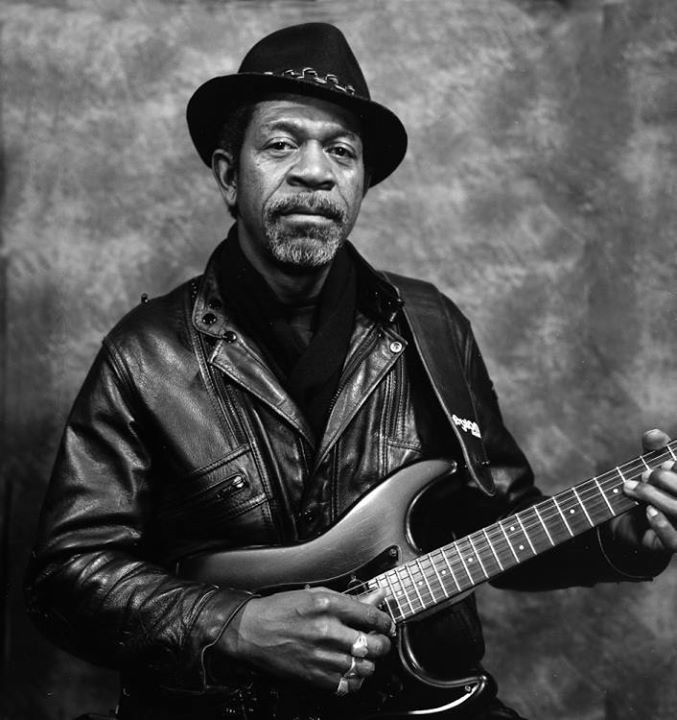American blues singer and guitarist, Allison, was born in Arkansas on 17 Aug 1937. He died from lung cancer in Madison, Wisconsin on 12 August 1997. Allison moved to Chicago in 1950s. He made his first recordings in 1967 for Delmark and a complete album in 1969. He was one of the few blues musicians to record for Motown in the 1970s. He adopted a rock-oriented approach when he moved to Europe in 1980. In 1998, he was inducted posthumously into the Blues Hall of Fame. The father of Bernard Allison from discogs. Luther Allison, the 14th of 15 musically gifted kids, was born in Widener, Arkansas, in 1939. He began playing the diddleybow (a wire attached to a wall with rocks to make bridges and a bottle for fretting the wire). In 1951, his family moved to Chicago, where Luther started taking in the sounds of Robert Nighthawk, Sonny Boy Williamson and Muddy Waters. Luther was a classmate of Muddy Waters’ boy and would occasionally stop by the Waters house to see the master rehearsal. Luther started playing the blues and jamming with Ollie’s band when he was 18, after he had lived in Chicago for seven years. In 1957, Allison quit school and started a band called The Rolling Stones. They decided to change the name and formed The Four Jivers. They gigged all over Chicago’s West Side. Luther soon found himself jamming with some of the West Side’s finest, including Magic Sam and Otis Rush. Allison encouraged Luther to sing. Allison said, “That was my school.” King started touring nationally in the 1960s. Allison assumed control of King’s band and his weekly gigs at Walton’s Corner. He was quickly one of the most popular acts on the West Side. Allison worked hard for five years to perfect his craft. For a year, he moved to California and teamed up with Sunnyland Slim and Shakey Jake Harris. After he was a leader in the Delmark anthology Sweet Home Chicago, he recorded his first two songs. Then, he released his first solo album, Love Me Mama (also on Delmark), which featured hard-hitting blues and spoke to the increasing rock audience. Luther was a major blues-rock star even before his debut album was released. John Fishel (the festival’s program director) raved that Allison’s guitar riffs “defied the impossible”. He brought him back to perform at the next two festivals. As the only blues artist on Motown Records, Allison signed in 1972 with them. While his three albums for the Gordy subsidiary resulted in numerous concert dates, as well as appearances at both national and international festivals, domestic interest in blues was declining. He was convinced Paris was the right place after he found acceptance in Europe. Although he achieved superstar status in Europe, and released 12 European records, his influence on the American music scene declined. He announced his return to the music scene in 1994 with Soul Fixin’ Man, Allison’s first album in twenty years. Guitar Player said that “fever and chills performances” were “fun and chills,” adding that “ferocious solos combine wisdom from a master storyteller, with the elegance of B.B. King, Buddy Guy’s elasticity and the big sting from Albert King. America was once more paying attention to Luther Allison after three huge U.S. tours. Blue Streak followed suit, and there was a lot of praise and admiration. The Washington Post raved about Allison’s “sonic roar” that was as soulful and powerful as his gospel-shout vocals. Blues Revue reported that Luther Allison’s new album is “nothing short of a masterpiece from a master.” Allison’s continued touring saw him bringing his band from San Francisco Blues Festival, New York, to the Central Park Summerstage and all stops in between. Allison achieved even greater heights with Reckless. Guitar World described Allison as “Reckless” in the very best sense of the term, moving on a razor’s edge and remaining within control. Hard-driving single-note leads from the West Side Chicago with a soulful base and a rock edge. Allison was a show stopper throughout it all. He was a blues legend thanks to his unwavering energy and relentless guitar attack. The blues world was stunned to hear that Allison had been diagnosed in July 1997 with inoperable lung carcinoma. They were shocked when he passed away four weeks later. Music fans lost one of the most popular and exciting blues performers of all time, Luther Allison’s passing. Live In Chicago is where Allison continues to live, as he sings the songs with the unwavering desire to give all he can to his audience. Listening to the album will allow fans to feel the power and redemptive force of Luther Allison’s songs. From www.alligator.com
